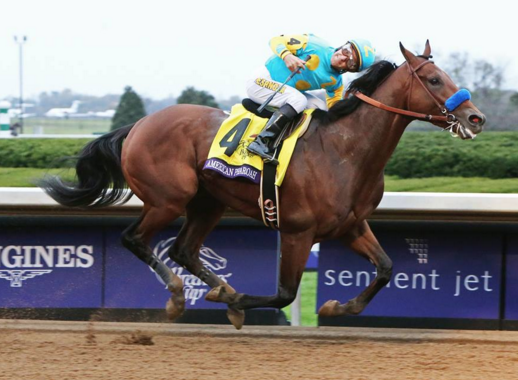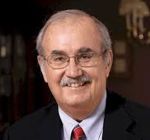A popular topic on the Churchill Downs backstretch this week has been the so-called “Pharoah Effect.” That’s the name that has been given to how much – or little – impact American Pharoah’s tour de force in last year’s Triple Crown will have on the sport/business of thoroughbred racing.
On one side are the proponents who believe that racing will see an increase in attendance, racing and betting because Pharoah earned so many new, young fans and became known in households where the name “Secretariat” might even draw a puzzled look and some head-scratching.
But on the other side are the naysayers who believe that American Pharoah’s singular achievement will not change the game in any significant way. Just because fans get hooked on one horse, this line of reasoning goes, they will not necessarily get excited about seeing the card at, say, Turfway Park on a cold winter night in February.

The early returns look good for those who believe in the positive side of the “Pharoah Effect. Pharoah memorabilia – photos, paintings, books, and apparel – seem to still be selling at a brisk pace. Trainer Bob Baffert has become a celebrity whose fame crosses over into forms of media other than the trade publications. And there still is much discussion about the first Triple Crown winner since Affirmed in 1978.
But the jury is still out and a verdict won’t be rendered until after this year’s Breeders Cup program in November. As usual, the truth will be found in hard, cold numbers. Unless there is a significant increase in attendance, betting, and TV ratings, it will be difficult to make the case that American Pharoah had any appreciable impact on the sport.
A study of the last three Triple Crown winners before Pharoah – Secretariat in 1973, Seattle Slew in 1977, and Affirmed in 1978 – doesn’t offer any clues, one way or another.
Although Secretariat ran the greatest Triple Crown series ever – track records in the Derby, Preakness, and Belmont Stakes – he also was upset twice at Saratoga in August by Onion and Prove Out, a couple of modestly talented steeds trained by Allen Jerkens, who wasn’t nicknamed “The Giant Killer” for nothing.
That didn’t take any of the luster of Secretariat’s Triple Crown. It just showed he was mortal, after all, and opened the way for critics to argue that he wasn’t as good as Man o’ War, who lost only one race in his three-year career, or Citation, who won the 1948 Triple Crown for Calumet Farm.
There was widespread interest in the 1974 Derby – Churchill cracked 170,000 in attendance for the first time — but only a small part was due to Secretariat’s stunning accomplishment the previous. That was the year of the 100th Kentucky Derby, which was modeled after the Epsom Derby in England, and Princess Margaret, sister to Queen Elizabeth II, led the long list of dignitaries and celebrities.
By the time Seattle Slew came along in 1977, many didn’t seem ready for another super-horse. It was too soon after Secretariat. So even though Slew became the first unbeaten horse to win the Triple Crown, he never seemed to get the attention he deserved – no Time and Newsweek covers, for example – because, well, he wasn’t Secretariat.
If there was any such thing as the “Slew Effect,” it was difficult to see with the naked eye in 1978 because of Affirmed and Alydar. They had race against each other six times as 2-year-olds, Affirmed winning four, and so already had a fierce rivalry going when the Triple Crown rolled around.
Nobody really saw a Triple Crown coming because (a) it was too soon after Slew, and (b) Alydar and Affirmed were so evenly matched that it was difficult to believe one could beat the other three straight times. But that’s exactly what happened, Affirmed holding off Alydar’s late kick in Louisville, Baltimore, and Belmont, Long Island, New York.
As amazing as it was, the Affirmed-Alydar rivalry had little to do with the excitement surrounding the 1979 Derby, mainly because Triple Crown devotees already had fallen in love with Spectacular Bid, who was plenty good, but also blessed with competition that was mediocre, at best.
After Bid stormed home to win the Derby and Preakness, he seemed a lock to become racing’s third consecutive Triple Crown winner. A certain Louisville sports editor, who shall go nameless, even typed out a column that was headlined, “Has the Triple Crown become too easy?”
But, incredibly, Bid finished only third in the Belmont. His excuses were a safety pin lodged in one of his hooves, and a poorly judged ride by his headstrong jockey, Ronnie Franklin.
Kentucky Derby
Saturday, May 7
Post time: 6:24 p.m. Eastern Time
Coverage: NBC, 4 p.m.; NBC Sports Network, noon; WLEX (Lexington), WAVE (Louisville) all-day
As a 4-year-old, Bid went 9-for-9, all with Hall of Fame jockey Bill Shoemaker in the saddle. I now believe that he was the late truly great Derby winner until American Pharoah did his thing last year.
This year the Derby favorite will be the unbeaten Nyquist, who has won all seven of his starts. Yet so far he hasn’t created as much excitement as Pharoah did before last year’s Derby. Who knows why? Some say he hasn’t worked well since coming to Kentucky. Others contend that his breeding does not give him the stamina to win at the Derby’s mile and a quarter.
There’s also the fact that many racing fans, who went 37 years without a Triple Crown winner, don’t believe they’ll get another one so soon. Some American Pharoah fans might even be pulling against him because they don’t want Pharoah sharing his pedestal with anybody else anytime soon.
So what to make of the “Pharoah Effect”?
I tend to go with the naysayers, and one reason is that racing’s marketing organizations – all those Alphabet Organizations such as the NTRA, TRA, HPBA, and others — are all hat and no cowboy when it comes to marketing. Can somebody please tell me why Baffert hasn’t gotten at least one national TV commercial out of his work with American Pharoah? That’s an indictment not of Baffert, but of an industry that, in some cases, seems stuck in the 1950s.
I know there’s a “Pharoah Effect” because I can feel it. People who usually have no interest in racing want to tell me where they were and what they did when Pharoah hit the finish line in the Belmont.
But I also don’t believe that it will have much of a measurable impact on the sport as a whole. If anything, attendance, betting, and TV ratings may be down this year because now that the public has the Triple Crown winner it has so long awaited, many may not have the same sense of excitement and anticipation that belonged to Pharoah from his first day at Churchill to his last day at Belmont Park.
Of course, the “Pharoah Effect” also may become more reality than theory if either Baffert, who’s saddling Mor Spirit, or Espinoza, who’s riding Whitmore, wins Derby 142 Saturday. They will be asked repeatedly to compare their current Derby winner with American Pharoah, which they will gladly do – and have done already, many times, on the Churchill backside.
The ultimate test, of course, is whether Pharoadh will have the staying power of Secretariat. People are still talking about the big red horse and buying his merchandise even though 43 years springs have come and gone since he became the first equine hero of the media age.
Billy Reed is a member of the U.S. Basketball Writers Hall of Fame, the Kentucky Journalism Hall of Fame, the Kentucky Athletic Hall of Fame and the Transylvania University Hall of Fame. He has been named Kentucky Sports Writer of the Year eight times and has won the Eclipse Award twice. Reed has written about a multitude of sports events for over four decades, but he is perhaps one of media’s most knowledgeable writers on the Kentucky Derby


















